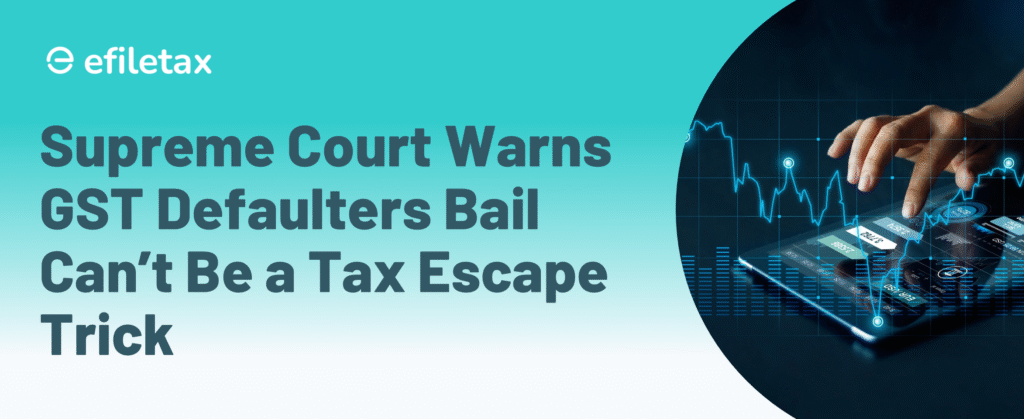
Supreme Court on GST Bail Security What You Must Know
Recently, the Supreme Court on GST bail security strongly criticised the misuse of bail conditions by GST defaulters. The apex court pulled up the Madras High Court for imposing unrealistic bail security to secure tax dues, instead of deciding bail purely on legal merits.
Let’s break down this landmark development for Indian taxpayers and consultants.
Background: Why Did the Supreme Court Intervene?
- A businessman from Tamil Nadu was accused of evading GST worth ₹7.71 crore.
- While granting bail, the Madras High Court directed him to deposit ₹2 crore as security.
- The taxpayer approached the Supreme Court, arguing that such a condition effectively denies bail, which should be based on legal grounds, not tax recovery.
What Did the Supreme Court Say?
The top court made clear:
✅ Bail security must not replace proper tax recovery.
✅ High Courts must decide bail pleas on merits, not use bail as a tool for revenue collection.
✅ Such conditions could defeat the purpose of bail as a fundamental right under criminal law.
Case Reference: Sathishkumar v. State Tax Officer (SLP (Crl) No. 5624/2024)
Legal Basis: GST Act & Bail
- Section 132, CGST Act: Provides punishment for GST offences.
- Bail Provisions: Governed by CrPC, not tax law.
- Revenue Recovery: Should follow proper procedures under GST Law (e.g., DRC proceedings), not via bail orders.
Expert Tip: How to Handle Bail in GST Cases
“Always challenge unreasonable bail conditions at the earliest. Bail should not become a substitute for recovery under the GST Act. Engage a GST lawyer with experience in both tax and criminal law.” — Efiletax Panel
What Taxpayers Should Do Now
If facing a GST investigation:
- Cooperate fully and respond to summons.
- Seek bail on merit, not on pre-payment conditions.
- Know your rights: Unreasonable security can be challenged up to the Supreme Court.
FAQs on GST Bail Conditions
Q1: Can GST officers demand payment before granting bail?
No. Only the court can decide bail conditions. Recovery must follow GST law.
Q2: What if the court imposes huge security?
Approach a higher court. The Supreme Court ruling supports challenging unrealistic bail securities.
Q3: Will this ruling help other taxpayers?
Yes. It sets a precedent against misusing bail to force payment.
Key Takeaway
✅ Supreme Court on GST bail security: Bail must be decided on merit, not used for tax recovery. This upholds fairness for taxpayers facing prosecution.
Conclusion
The Supreme Court’s strong stand protects taxpayers from unfair bail conditions. If you need help navigating GST summons, arrests, or recovery, connect with Efiletax — your trusted partner for tax and legal compliance.
Summary
The Supreme Court slammed misuse of bail security in GST cases, directing High Courts to grant bail on legal merit, not as a tool for tax recovery. This ruling ensures fair treatment for taxpayers accused of GST offences. Know your rights and consult experts.